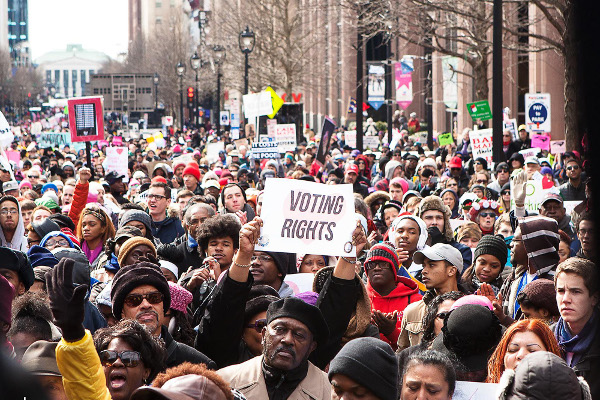
PHOTO/KAITLYN BARLOW
As automation of the workplace becomes the norm in America, workers are either out of a job permanently or forced to accept progressively lower wages, unable to provide the funds to put food on the table, pay for housing or receive sufficient health care. As this pattern continues—it’s estimated that in 20 years 50% of labor will be performed by machines—growing numbers of people will simply become less and less able to survive in this society.
On the one hand, the ability to produce an abundance of goods is enabled by the new technologies of our time. On the other hand, the laws of private property under capitalism will not allow the system to provide these resources to anyone without money to pay.
The presidential election reflects peoples’ growing consciousness of this serious dilemma festering within our society. The American people are frustrated and prepared for action; they’re averse to the clichéd political tactics they’ve seen employed in every past election and are drawn to the populist candidates who they think least resemble the corrupt political structure. This is especially seen in the candidacies of Trump and Sanders. Although Trump’s fascist vision is certainly very different from Sanders’ views, both candidates garner support from a critically important section of the working class, those decimated by globalization, automation and plant closures. This is what makes this election so important. Which way these workers go will in no small way influence the thinking of huge sections of Americans. Revolutionaries have to reach these workers.
High-tech automation means the jobs are gone forever. The small core of corporate billionaires who run the country are well aware that the system cannot provide jobs, and they are determined to maintain their private property and privilege in the face of a dying system. They are united in the need to put down the growing struggle of the people for their survival. Their solution is a fascist reorganization of society.
The only solution for the people is a cooperative society where the now privately owned means of life that produce the healthcare, utilities, water, housing, etc., is taken out of corporate hands and put into the hands of the public. How else can we survive?
Bearing this in mind, the Sanders campaign offers real possibilities for bringing this vision to the people. This is true because of his use of the word socialism, and also, because of the range of issues he raises, such as universal health care, publicly financed college, and environmental values. The Sander’s campaign calls attention to corporate influence over public policy, directing people’s anger towards the wealthy, while Trump channels people’s anger towards immigrants and racial and religious minorities, in order to push the dispossessed towards a fascist movement backed by the corporations.
Thus the 2016 election is an important factor in swaying the course of our country. It offers revolutionaries the opportunity to put forward the next step in the fight for the cooperative society we need. That step is that our government actually fulfills what should be its purpose: to provide for the needs of the people, not the billionaires and their corporations.

